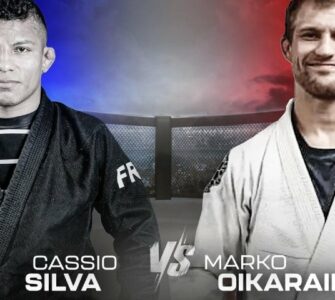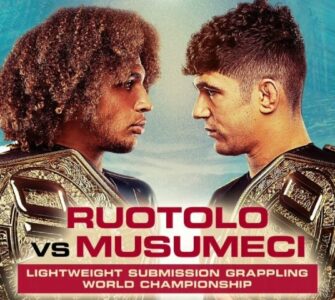As a combat sport, mixed martial arts (MMA) has evolved dramatically over the last few decades. One discipline that has proven to be a game-changer in the Ultimate Fighting Championship (UFC) is Brazilian jiu-jitsu (BJJ).
Ground fighting is a hallmark of BJJ, and it has revolutionized the way fighters approach their matches. The unique combination of technique and strategy in BJJ makes it a powerful tool for wrestlers, strikers, and other athletes who step into the octagon.
In this blog post, we explore how jiu-jitsu is dominating the UFC and changing the face of modern MMA.
The rise of Brazilian jiu-jitsu in MMA and the UFC
The rise of Brazilian jiu-jitsu in MMA and the UFC can be traced back to the days of the Ultimate Fighting Championship, where fighters quickly discovered the importance of grappling and ground fighting to win matches.
Brazilian jiu-jitsu’s effectiveness was exemplified by Brazilian fighter Royce Gracie, who dominated the earlier UFC events with his BJJ technique, paving the way for other fighters to adopt this martial art as a crucial component of their fight strategy.
Today, MMA fighters consider BJJ to be indispensable, with many gyms cropping up all over the world. Aspiring fighters are drawn to BJJ due to its successful track record, and it is now an integral part of MMA fight tactics. Its influence is evident, as trends and statistics continue to show increased use of jiu-jitsu in the UFC.
How MMA fighters benefit from learning jiu-jitsu techniques
Learning jiu-jitsu techniques can greatly benefit MMA fighters, as it prepares them to defend against submissions and provides them with crucial problem-solving skills. High-level jiu-jitsu training leads to improved physical fitness and self-defense skills, making it practically essential for fighters competing in the UFC or Bellator. Even fighters with a high level of striking skills can benefit from learning jiu-jitsu techniques, as the combination of both striking and grappling skills can create a well-rounded fighter.
Also, the impact of jiu-jitsu on MMA fight strategy and tactics cannot be underestimated, as fighters who are proficient in jiu-jitsu are able to dominate their opponents on the ground and dictate the pace of the fight. It’s no wonder that jiu-jitsu is dominating the UFC, as it gives fighters a competitive edge and prepares them for any situation inside the octagon.
What are the odds?
Sports bettors interested in MMA matches have many opportunities to place bets on upcoming fights in the UFC. From simple bets on the winner of a fight to more complex handicapping and under/over markets, bettors can take advantage of valuable odds by focusing on the strategies shared by fighters.
BJJ is a dominant technique in MMA, and those who specialize in grappling and submission techniques can use their ground game to dominate their opponents.
In addition to considering each fighter’s fighting style and tactical advantage, bettors can also look at trends and statistics showing the increased use of jiu-jitsu in the UFC. By keeping an eye on the UFC upcoming match odds, bettors can make informed decisions when placing their bets on the next big MMA event.
Top jiu-jitsu practitioners in the history of the UFC
In the history of the UFC, there have been many outstanding jiu-jitsu practitioners who have dominated their opponents with their grappling skills. One of the most famous is Royce Gracie, who won the first UFC tournament in 1993 by defeating opponents with his BJJ techniques. Another top jiu-jitsu practitioner is Demian Maia who has a record-breaking number of submission victories in the UFC.
Ronaldo Souza, also known as Jacare, is another top fighter who has won multiple BJJ tournaments and has a high percentage of submission victories in the UFC. Anderson Silva, although also known for his striking abilities, is a black belt in BJJ and has submitted opponents in the octagon. These jiu-jitsu experts have proven that grappling skills are vital in UFC fights and have inspired many fighters to incorporate BJJ techniques into their training regimes.
The impact of jiu-jitsu on MMA fight strategy and tactics
The rise of Brazilian jiu-jitsu in MMA and the UFC has had a significant impact on the sport’s fight strategy and tactics. The introduction of BJJ techniques has revolutionized MMA, shifting the focus from striking to grappling and ground fighting. Fighters who incorporate BJJ into their training regime have more tools at their disposal, allowing them to control their opponents, wear them down, and ultimately secure a submission victory.
BJJ has also influenced the characteristic of technical-tactical behavior in the Octagon, as fighters choose their combat strategies based on their understanding of BJJ techniques. Increased use of jiu-jitsu in the UFC has led to a trend that shows the sport’s evolution and the impact of BJJ on popular culture and the martial arts community.
Trends and statistics showing increased use of jiu-jitsu in the UFC
The rise of Brazilian jiu-jitsu in MMA and the UFC can be seen through trends and statistics showing increased use of jiu-jitsu in fights. Many of the top UFC fighters utilize jiu-jitsu techniques and have a background in the martial art. According to recent data, BJJ was the most successful grappling art in UFC history, leading to an increase in its popularity among fighters.
In fact, 27% of UFC main events have featured a Brazilian jiu-jitsu black belt. Additionally, the percentage of submission wins has steadily increased in the UFC, with jiu-jitsu being the primary submission style used. This trend further highlights the effectiveness and dominance of jiu-jitsu in the octagon.
Jiu-jitsu’s influence on popular culture and the martial arts community.
Jiu-jitsu’s influence on popular culture and the martial arts community cannot be overlooked. Thanks to the Ultimate Fighting Championship, BJJ has grown in popularity in recent years, with numerous MMA fighters incorporating its techniques into their fighting styles. \
With the rise of MMA and UFC, jiu-jitsu is no longer just seen as a traditional martial art but as a combat sport. This has led to more people training in BJJ and an exponential growth in the number of practitioners worldwide.
Jiu-jitsu’s influence on popular culture extends beyond the octagon, with TV shows, movies, and video games featuring the art. It has also had a significant impact on the martial arts community, with more schools offering BJJ classes as part of their curriculum, and a new wave of jiu-jitsu practitioners emerging as high-level competitors in tournaments around the world.

















